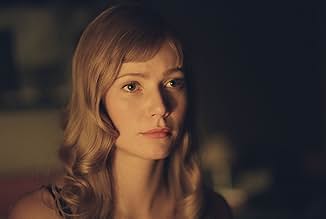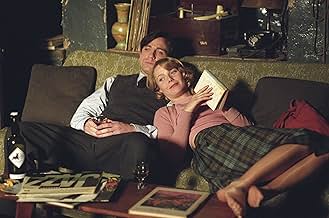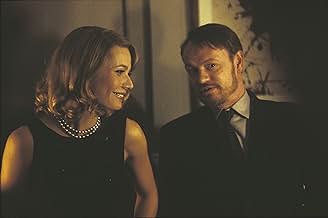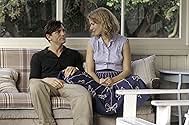VALUTAZIONE IMDb
6,3/10
11.490
LA TUA VALUTAZIONE
Aggiungi una trama nella tua linguaStory of the relationship between poets Edward James "Ted" Hughes and Sylvia Plath.Story of the relationship between poets Edward James "Ted" Hughes and Sylvia Plath.Story of the relationship between poets Edward James "Ted" Hughes and Sylvia Plath.
- Premi
- 1 vittoria in totale
Recensioni in evidenza
What is it about an artist dying young - particularly if it is at his or her own hands - that strikes such a deep chord in so many of us? Is it the fact that this rare and special person achieves a kind of mastery of fate at the last moment, a perfect conclusion to this messy business of life that we mere mortals can never hope to attain? Could it be that this early death is just one more instance of an artist taking the elements of raw reality and transforming them into something stylized, transcendent and meaningful for the rest of us to brood over and contemplate? When poet and novelist Sylvia Plath committed suicide in 1963, she became the archetype of the tortured artist - particularly for sensitive young people who came to romanticize her end and her suffering in ways that lifted her and her work to iconic status.
The biopic, entitled simply 'Sylvia,' gets the 'tortured' part pretty much right, but has considerably less success with the 'artist.'
The film focuses mainly on the tumultuous relationship between Plath and her husband of eight years, famed poet Ted Hughes. The story begins in 1956 with their love-at-first-sight meeting when they were both students at Cambridge University. The film moves quickly through the years, showing how, after a short period of relative marital bliss, Ted's philandering began to take its toll on the relationship. As portrayed in the movie, Sylvia, despite her notable talent, is a mass of neuroses and insecurities, always toiling in the shadows of her (initially at least) much more well known and commercially successful husband. But her feelings of inadequacy and jealousy over Ted's infidelities cannot, in and of themselves, entirely account for her paranoia, her outbursts of anger and her suicidal tendencies. Those resulted mainly from the clinical depression that tormented the woman from the time of her father's death early in her childhood to her own tragic end. The movie sidesteps the electroshock therapy Plath underwent at various times in her life (though it very subtly hints at them), yet the film still manages to convey just how great a victim she was of this disease she could not overcome.
Thanks to John Brownlow's rather singlemindedly depressing screenplay, there's a tremendous feeling of sadness hovering over the film. Director Christine Jeffs brings a raw intensity to many of the confrontation scenes involving the pain-wracked, benighted couple. As Sylvia and Ted, Gwyneth Paltrow and Daniel Craig give rich, moving and sensitive performances, and Michael Gambon leaves his mark as a sympathetic neighbor who tries but does not succeed at saving Sylvia.
If there is a flaw in 'Sylvia,' it is one common to films that attempt to portray the lives of artists, particularly writers. Although a scenarist can dramatize the details of an artist's life, it is virtually impossible for him to capture the richness and power of the art itself in the different medium of film. We never get the sense of how Sylvia either overcomes the difficulties of her life to succeed in her writing or how she uses those difficulties to enhance her art. What we do get is a few shots of Sylvia sitting in front of a typewriter, a comment or two about a book that has been or is soon to be published, a few references to critical reviews, and a smattering of voice-over recitations of Plath's poetry. What we don't get and what it is virtually impossible for film to capture is the essence of the writing itself. For this, one needs to return to the source material, the works that have lived on after the woman herself all these years. If the movie inspires new people to explore Sylvia Plath's writing, it will not have been in vain
The biopic, entitled simply 'Sylvia,' gets the 'tortured' part pretty much right, but has considerably less success with the 'artist.'
The film focuses mainly on the tumultuous relationship between Plath and her husband of eight years, famed poet Ted Hughes. The story begins in 1956 with their love-at-first-sight meeting when they were both students at Cambridge University. The film moves quickly through the years, showing how, after a short period of relative marital bliss, Ted's philandering began to take its toll on the relationship. As portrayed in the movie, Sylvia, despite her notable talent, is a mass of neuroses and insecurities, always toiling in the shadows of her (initially at least) much more well known and commercially successful husband. But her feelings of inadequacy and jealousy over Ted's infidelities cannot, in and of themselves, entirely account for her paranoia, her outbursts of anger and her suicidal tendencies. Those resulted mainly from the clinical depression that tormented the woman from the time of her father's death early in her childhood to her own tragic end. The movie sidesteps the electroshock therapy Plath underwent at various times in her life (though it very subtly hints at them), yet the film still manages to convey just how great a victim she was of this disease she could not overcome.
Thanks to John Brownlow's rather singlemindedly depressing screenplay, there's a tremendous feeling of sadness hovering over the film. Director Christine Jeffs brings a raw intensity to many of the confrontation scenes involving the pain-wracked, benighted couple. As Sylvia and Ted, Gwyneth Paltrow and Daniel Craig give rich, moving and sensitive performances, and Michael Gambon leaves his mark as a sympathetic neighbor who tries but does not succeed at saving Sylvia.
If there is a flaw in 'Sylvia,' it is one common to films that attempt to portray the lives of artists, particularly writers. Although a scenarist can dramatize the details of an artist's life, it is virtually impossible for him to capture the richness and power of the art itself in the different medium of film. We never get the sense of how Sylvia either overcomes the difficulties of her life to succeed in her writing or how she uses those difficulties to enhance her art. What we do get is a few shots of Sylvia sitting in front of a typewriter, a comment or two about a book that has been or is soon to be published, a few references to critical reviews, and a smattering of voice-over recitations of Plath's poetry. What we don't get and what it is virtually impossible for film to capture is the essence of the writing itself. For this, one needs to return to the source material, the works that have lived on after the woman herself all these years. If the movie inspires new people to explore Sylvia Plath's writing, it will not have been in vain
What makes poetry a special art form? Answers might include bringing together extremes of joy and despair within a couple of lines, offering an alternative to rational thought, enriching our outlook and understanding in ways that prose would struggle to equal. Poetry can provide a single phrase or sentence that is easily remembered and somehow unlocks difficult-to-express inner states, just as a song can (and poetry is the basis of songs). It offers a freedom of expression where you don't need to explain every aspect of what you are saying - it urges the listener to grasp a semi-spoken truth or idea.
That's my rough guess. I've got over 40 books of poetry on my bookshelf at the last count, yet I'm no literary expert and appreciate poetry in a very simple way. Most people might agree that poetry offers something special, so a film celebrating the life of a famous poet might be expected to bring us a glimmer of that something.
Sylvia Plath has been championed not only as a poet but as a sort of feminist' a cry on behalf of women treated as a commodity, subjugated by an unfair male-dominated system. Cast in the lead role, Gwyneth Paltrow's Plath focuses much attention on how downtrodden she was, chained to two children, overshadowed by a brilliant and celebrated Ted Hughes, struggling with bitterness, jealousy, mental instability and a less than attractive persona. We also get the occasional poetic outburst, from who-can-recite-poetry-fastest undergrad shenanigans to romanticised performances of Chaucer (addressed to an audience of watching cows whilst floating downstream in a boat). All punctuated with soft-focus shots of a naked Plath/Paltrow, hysterical and often violent outbursts at Hughes, and scenes of a generally uninteresting and uninspiring life of moderate wretchedness. The only thing that distinguishes Sylvia from the now-unfashionable kitchen sink drama is that its central character is called Sylvia Plath.
So is the film worthy of the title? In A Beautiful Mind, we learnt of the joy of mathematics, Lunzhin Defence championed the addictive mysteries of chess, and Dead Poets Society made us lift our eyes to literary horizons that could inspire the dullest of minds. Sylvia was limited, perhaps, by the refusal of her daughter to allow much of Plath's poetry to be used in the film but, for whatever reason, it has failed to be more than a rather humdrum biopic. It offers little insight into her poetry or the magic of poetry generally, and adds little of interest about the historical figure that doesn't apply to millions of women. If any deep philosophical statement can be drawn from this, the film certainly doesn't make it, poetically or otherwise. Sadly, it would seem that the words of Sylvia Plath's daughter almost became a self-fulfilling prophecy: "Now they want to make a film . .. They think I should give them my mother's words . . . To fill the mouth of their monster . . . Their Sylvia Suicide Doll." Whilst not quite an empty doll, Sylvia is maybe an arm or leg short of a manikin.
That's my rough guess. I've got over 40 books of poetry on my bookshelf at the last count, yet I'm no literary expert and appreciate poetry in a very simple way. Most people might agree that poetry offers something special, so a film celebrating the life of a famous poet might be expected to bring us a glimmer of that something.
Sylvia Plath has been championed not only as a poet but as a sort of feminist' a cry on behalf of women treated as a commodity, subjugated by an unfair male-dominated system. Cast in the lead role, Gwyneth Paltrow's Plath focuses much attention on how downtrodden she was, chained to two children, overshadowed by a brilliant and celebrated Ted Hughes, struggling with bitterness, jealousy, mental instability and a less than attractive persona. We also get the occasional poetic outburst, from who-can-recite-poetry-fastest undergrad shenanigans to romanticised performances of Chaucer (addressed to an audience of watching cows whilst floating downstream in a boat). All punctuated with soft-focus shots of a naked Plath/Paltrow, hysterical and often violent outbursts at Hughes, and scenes of a generally uninteresting and uninspiring life of moderate wretchedness. The only thing that distinguishes Sylvia from the now-unfashionable kitchen sink drama is that its central character is called Sylvia Plath.
So is the film worthy of the title? In A Beautiful Mind, we learnt of the joy of mathematics, Lunzhin Defence championed the addictive mysteries of chess, and Dead Poets Society made us lift our eyes to literary horizons that could inspire the dullest of minds. Sylvia was limited, perhaps, by the refusal of her daughter to allow much of Plath's poetry to be used in the film but, for whatever reason, it has failed to be more than a rather humdrum biopic. It offers little insight into her poetry or the magic of poetry generally, and adds little of interest about the historical figure that doesn't apply to millions of women. If any deep philosophical statement can be drawn from this, the film certainly doesn't make it, poetically or otherwise. Sadly, it would seem that the words of Sylvia Plath's daughter almost became a self-fulfilling prophecy: "Now they want to make a film . .. They think I should give them my mother's words . . . To fill the mouth of their monster . . . Their Sylvia Suicide Doll." Whilst not quite an empty doll, Sylvia is maybe an arm or leg short of a manikin.
It's 1956 Cambridge, England. American student Sylvia Plath (Gwyneth Paltrow) is dismissed by the high-minded poetry review. She is taken with fellow student Edward Ted Hughes (Daniel Craig)'s poems. They eventually get married. He has many female fans and she suspects his infidelity. They have two children. She struggles to write under successful Ted's overwhelming shadow. She falls into depression and eventually commits suicide in 1963.
It's a downbeat biopic that bothers on old-fashion melodrama. Paltrow is lovely but I figured Plath would be more fragile even before her breakdown. Daniel Craig has the prerequisite charisma. The movie is very flat. It is unable to elevate the material into something more dramatic. This is a long drawn out character study that isn't terribly interesting.
It's a downbeat biopic that bothers on old-fashion melodrama. Paltrow is lovely but I figured Plath would be more fragile even before her breakdown. Daniel Craig has the prerequisite charisma. The movie is very flat. It is unable to elevate the material into something more dramatic. This is a long drawn out character study that isn't terribly interesting.
There is a certain type of undergraduate who sees Sylvia Plath as the victim-heroine of a period that lionized talented men but had no place for women of similar gifts, and fortunately this film does not pander to them. Poets rarely receive lavish acclaim or wealth during their lifetimes, and hers was at least equal to her talent and irrespective of her gender. Any reasonably critical reader of her autobiographical novel The Bell Jar can see evidence of serious mental illness, which in Plath's case went largely untreated, and this film chooses to focus more on that aspect of her life than on anti-feminist conspiracy theories. However, the film comes up short of fully showing Plath as the highly complex and contradictory person her contemporaries knew: sexy, seductive yet so harsh and venal in her judgments of men (especially her husband and her father) as to seem man-hating; also manipulative and vain and yet so insecure that she went long periods without writing. She was likely bi-polar and could on occasion be described as downright monstrous, yet the film hollywoodizes Plath into a more conventional 'troubled' melodrama heroine, rather than delving deeper into the brutal reality of the day-to-day life of someone with significant mental illness. This is surprising given that director Christine Jeffs' earlier film on mental illness, Rain, was unstintingly honest. Plath's well known life history is covered in straightforward biopic narrative: her close-distant, love-hate yo-yo relationship with her mother; her famous first suicide attempt and the subsequent year spent in a sanatorium that was the basis for The Bell Jar; her rocky marriage to British poet Ted Hughes that ended because of his infidelity; her prolific period as a celebrated poet and her eventual death by suicide while still young.
I should point out that I thought the cinematography and production design were wonderful. The excellent period look is established by bleeding out bright color from every scene while giving it an amber tint like old photographs. The sets were almost hyper-realistic - cluttered, dim and claustrophobic with none of the romanticized shininess that Hollywood often lavishes on period dramas.
I should point out that I thought the cinematography and production design were wonderful. The excellent period look is established by bleeding out bright color from every scene while giving it an amber tint like old photographs. The sets were almost hyper-realistic - cluttered, dim and claustrophobic with none of the romanticized shininess that Hollywood often lavishes on period dramas.
After viewing the film on Sylvia Plath, I felt a need to read about this poet and find out exactly what Hollywood did with it. As usual, Hollywood transformed a person's life into what an audience would want to be amused by. Mr. Hughes is personified as a womanizer and adulterer, the later of which may be true. After reading two biographies of Ms. Plath by Linda W. Wagner-Martin and Anne Stevenson and of course having studied Ms. Plath's poetry, I feel that the film, albeit entertaining does not depict her actual identity. It does a marginal account of her life, or part of her life. As any human being, Ms. Plath suffered from many demons. If you ascribe to an astrological standpoint (as Mr. and Mrs. Hughes did) you will find that Sylvia was doomed by her astrological sign, Scorpio. Those of you who are Scorpios know that there is a dark side to this sign. She set her expectations too high of most things and considered the failure of loyalty from her friends and family detrimental. Her experiences with depression only added fuel to the flame. Had she lived in modern times, maybe the newer therapies could have helped her. Depression is a severe affliction and may make a great poet, but for everyday living it can render a person helpless. It can make one helpless with dealing with marriage and children, life in general, and one's occupation. Sylvia Plath was a victim of her depression, her personality overreacting to life and her relationships. Unfortunately, she could not work her way through her inner problems and suffered the result of her mental blockage. Fortunately, for her children, they were unharmed by her mental illness and subsequent actions, and were eventually raised by their father. No one is to blame... no one is superhuman. If standards are set too high for anyone, as Sylvia set for herself, anyone is doomed to failure. We do have her poetry and novel(s) to see her inner self, which no film can properly depict.
Lo sapevi?
- QuizFrieda Hughes, Sylvia Plath's daughter and literary executor, didn't allow the producers to access to her mother's poetry. She also publicly denounced the project in a published poem of her own.
- BlooperWhen Ted and Sylvia are in bed together and she is discussing her suicide attempt, you can clearly see Daniel Craig's tattoo through the make up on his shoulder and Gwyneth Paltrow's hair net to which her wig is attached.
- Citazioni
Sylvia: [to Ted, after making love] We're not even two people. Even before we met, we were just these two halves, walking around with big gaping holes in the shape like the other person. And when we found each other we were finally whole. And then it was as if we couldn't stand being happy so we ripped ourselves in half again.
I più visti
Accedi per valutare e creare un elenco di titoli salvati per ottenere consigli personalizzati
- How long is Sylvia?Powered by Alexa
Dettagli
- Data di uscita
- Paese di origine
- Lingua
- Celebre anche come
- Ted and Sylvia
- Luoghi delle riprese
- Aziende produttrici
- Vedi altri crediti dell’azienda su IMDbPro
Botteghino
- Budget
- 7.000.000 £ (previsto)
- Lordo Stati Uniti e Canada
- 1.315.498 USD
- Fine settimana di apertura Stati Uniti e Canada
- 58.940 USD
- 19 ott 2003
- Lordo in tutto il mondo
- 2.917.393 USD
- Tempo di esecuzione1 ora 50 minuti
- Colore
- Mix di suoni
- Proporzioni
- 2.35 : 1
Contribuisci a questa pagina
Suggerisci una modifica o aggiungi i contenuti mancanti




































